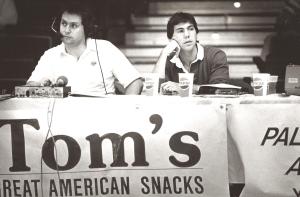I Was a Journalist, Never Equating it with Being ‘Scum,’ ‘Low-life’ and ‘Disgraceful’
Donald Trump has called me a “phony,” “low-life,” “scum,” “corrupt,” “dishonest,” “disgraceful,” “disgusting,” “illegitimate,” a “horrible” person, a “terrible” person, and probably more. Those are just the insults I’ve heard him speak and seen in news reports.
The presidential candidate’s invectives are aimed at journalists – all journalists. He paints the entire profession with a broad brush, labeling it with a negative stereotype, just as he does other groups of people, like Mexican rapists and fame-hungry, lying women.
I was a journalist for 13 years after college, and hold a master’s degree in journalism. Though I am not employed as a journalist now, I am still a journalist and writer at heart. My second book, a nonfiction account of my run for political office, Don’t Knock, He’s Dead: A Longshot Candidate Gets Schooled in the Unseemly Underbelly of American Campaign Politics (a timely topic given the current abhorrent campaign!), is journalistic in nature, combined with memoir.
I was a reporter for the Sarasota (FL) Herald-Tribune, The Baltimore Sun, a chain of
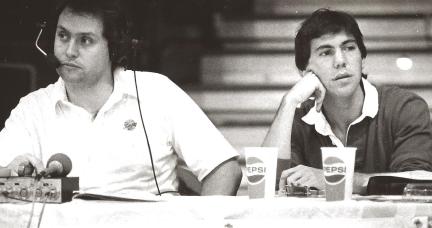
The blogger on the right, at basketball game early in my career as a Sarasota sportswriter
community newspapers and several trade publications. Trump is smearing a big part of my identity with his talk about corrupt media populated by nothing but cretins. Of course, to use a favorite Trump rejoinder, he’s WRONG!…WRONG!…WRONG!
The Orange Man and some – but certainly not all – of his supporters don’t know diddly about journalism, what it takes to be a good journalist, what stirs the heart and soul of a journalist, and what many journalists strive for in terms of ethics, honesty, fairness and truthfulness in performing their job.
Hey Trump and your band of merry men, how about taking a break from insult-hurling and baseless fear-mongering and watch Spotlight, the Academy Award-winning movie about Boston Globe journalists who won the Pulitzer Prize following their relentless pursuit of the child sexual abuse scandal and cover-up perpetrated by the Catholic Church leaders that extended to the top of the archdiocese and other powerful authorities? Who was the scum there? How many priests would still be shuffled along to a new church to find a new crop of boys to molest without the journalists’ intervention?
At the risk of sounding elitist, I don’t expect many of Trump’s supporters to understand – but merely to react to what they hear as gospel. It is common for some of Trump’s supporters to take up their leader’s cry at rallies and yell and point fingers at journalists and tell them, without ever having talked to them, that they are corrupt and they “suck.”
Reporters and editors, on the whole, are smart, intellectually curious, open-minded and highly educated. They enter journalism because they like debating ideas, considering different perspectives, thinking conceptually, abstractly and idealistically, learning new things, contributing to an open and just society, and educating others through expression. It would be rare for a reporter to get a job without a college degree. Fact is, the biggest cohort of Trump supporters are whites without a college education. I imagine they are some of the ones shouting down journalists with boos and obscenities as their instigator grins deviously at the podium. No clue what being a journalist truly is about.
Do journalists have biases? Yes, they all do. Everyone does. Journalists are human. Are more progressives (likely Democrats) drawn to journalism than conservatives? Probably. The profession appeals to crusaders and people interested in speaking for those who may not have a voice. Are there media outlets, including newspapers, known for being conservative as well as progressive? Yes, certainly. By and large, the media outlets reflect the prevailing ideologies and sensibilities of their communities.
The Arizona Republic, the state’s largest newspaper, had endorsed Republicans for president for the past 126 years, until breaking tradition this year. What happened when the newspaper broke ranks? Reporters, editors and even door-to-door subscription salespeople were greeted with screams, vitriol and even death threats.
The paper’s president and publisher wrote in a emotional and defiant column: “What is the correct response, really, to this:
‘YOU’RE DEAD. WATCH YOUR BACK.
WE WILL BURN YOU DOWN.
YOU SHOULD BE PUT IN FRONT OF A FIRING SQUAD AS A TRAITOR.’
[No, not LIES! Check the primary source.]
I have known and worked with many reporters and editors. By and large, they are tough-minded, persistent, constantly digging, obsessed with facts and public records, concerned with accuracy and driven by creating positive change, righting wrongs, exposing the truth and holding the feet of those in power to the fire.
I know how I acted as a journalist. And I repudiate Trump’s characterization. I strived for fairness; I made the extra call, even when I knew it would be uncomfortable, in an effort to incorporate all sides and views; I was as thorough and persistent as I could be; I tried to treat all subjects I encountered with respect; I fretted about my words and their potential impact; I was ethical.
I also tried to make stories interesting and readable for an audience. Editors demanded it – good, compelling writing, flow, telling a story imbued with some emotion and passion — saying something, moving readers. This is another aspect of journalism about which Trump and his ilk have no concept. Journalists are not merely fact-reciters. I tended to fall into this trap as a journalist until good editors beat it out of me – the lazy, “He said, she said” type of story going back and forth between two sides. Instead, journalists become authorities and experts on the subjects they cover, and as they get to know their topics and sources in depth, their expertise comes through in their writing as they sift through the facts, perspectives and opinions. If a journalist knows something to be true by virtue of their reporting and facts pointing to a conclusion, it’s part of their job as writers to say it with authority and back it up while also presenting opposing or different views.
Earlier this month, the Committee to Protect Journalists issued an extraordinary warning about Trump’s threat to journalists everywhere and to the U.S. Constitution’s First Amendment. In part, it reads:
“Guaranteeing the free flow of information to citizens through a robust, independent press is essential to American democracy. For more than 200 years this founding principle has protected journalists in the United States and inspired those around the world, including brave journalists facing violence, censorship, and government repression.
Donald Trump, through his words and actions as a candidate for president of the United States, has consistently betrayed First Amendment values…CPJ’s board of directors passed a resolution declaring Trump an unprecedented threat to the rights of journalists and to CPJ’s ability to advocate for press freedom around the world.”
There are plenty of reasons to recoil in disgust with Trump. His blasphemous tirade against journalists – members of one of the institutions that truly does make America great compared to other autocratic, oppressive nations, like Trump endlessly pronounces – hits home with me more than some others.
Ink-stained wretches, nigh “scum” and “low-lifes,” unite!

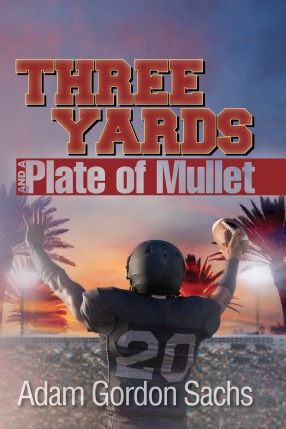 and Disaster, and treat those two imposters just the same,” embracing both the barbs and laurels with ego holding steady.
and Disaster, and treat those two imposters just the same,” embracing both the barbs and laurels with ego holding steady.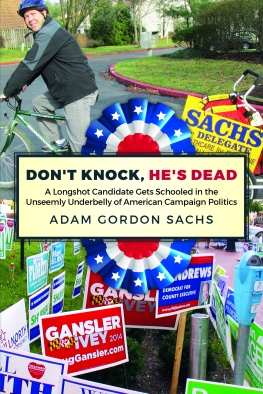 counselor, and author of the Spartan Considerations political blog, which I followed during my campaign and referenced several times in the book.
counselor, and author of the Spartan Considerations political blog, which I followed during my campaign and referenced several times in the book.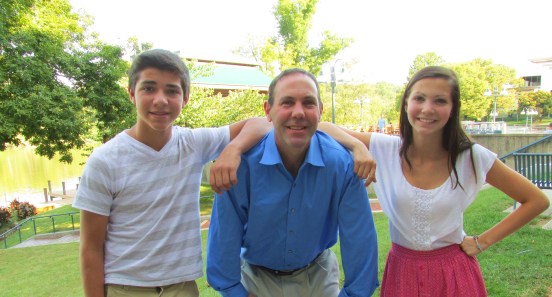 and career changes, among other topics.
and career changes, among other topics.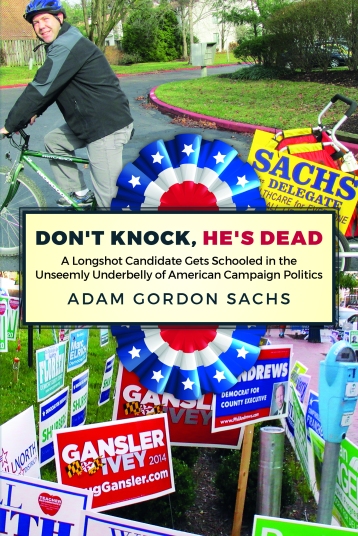 he time is right to run, someday, Don’t Knock, He’s Dead will either inspire you or disavow you of that foolish notion forever.
he time is right to run, someday, Don’t Knock, He’s Dead will either inspire you or disavow you of that foolish notion forever.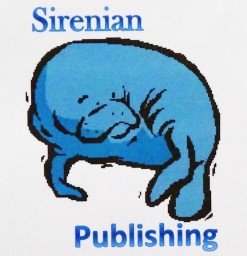 under-funded candidate without the assemblage of a political machine to try to break into the byzantine world of state-level politics, where cozy relationships, cronyism, influence, backroom deals, power plays and horse-trading rule the day.
under-funded candidate without the assemblage of a political machine to try to break into the byzantine world of state-level politics, where cozy relationships, cronyism, influence, backroom deals, power plays and horse-trading rule the day.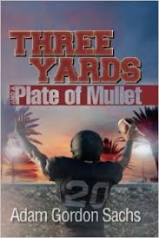 triumphed over long odds as an unknown author by persuading a publisher to acquire my book. I had wanted to progress from a self-published author to one backed by the heft, resources and credibility of a traditional commercial publisher, which I believed would open more doors and opportunities to bring the novel to a broader audience. I expected there would be a payment for my work. But when I read the agreement, I realized it wasn’t quite that simple.
triumphed over long odds as an unknown author by persuading a publisher to acquire my book. I had wanted to progress from a self-published author to one backed by the heft, resources and credibility of a traditional commercial publisher, which I believed would open more doors and opportunities to bring the novel to a broader audience. I expected there would be a payment for my work. But when I read the agreement, I realized it wasn’t quite that simple.